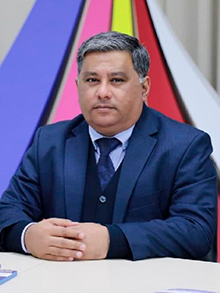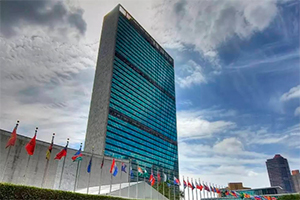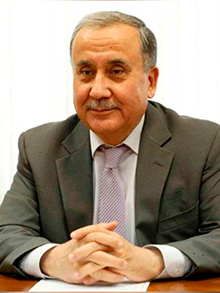
Armenia and Azerbaijan Address Concerns Over Territorial Integrity  By Vasif HUSEYNOV, PhD, Head of Department, AIR Center, Adjunct Lecturer, ADA and Khazar Universities, Baku
By Vasif HUSEYNOV, PhD, Head of Department, AIR Center, Adjunct Lecturer, ADA and Khazar Universities, Baku
On January 19, Armenian Prime Minister Nikol Pashinyan called for a new constitution in a meeting with senior officials from the Armenian Ministry of Justice. Pashinyan asserted that Armenia needs “a new constitution, not constitutional changes,” adding that the new foundational document would make the country “more competitive and viable in the new geopolitical and regional environment” (Azatutyun.am, January 19). He highlighted that the new constitution would maintain the present parliamentary system and underscored “external security” and “internationally recognized sovereign territory” as the main issues to be addressed. Mutual respect for one another’s territorial integrity remains a sticking point in peace negotiations between Armenia and Azerbaijan. If Yerevan proceeds with Pashinyan’s proposal, the new constitution will eliminate certain hurdles to signing a peace treaty with Baku.
READ MORE
- EGF Editor |
Published on EGF: 30.01.2024
| Security
-
The Emerging Azerbaijan-Gulf Partnership in Energy
 By Fuad Shahbazov, Baku-based independent regional security and defence analyst
By Fuad Shahbazov, Baku-based independent regional security and defence analyst
On January 8, Mohammad bin Zayed Al-Nahyan (MBZ), the leader of the United Arab Emirates (UAE), paid an official visit to Azerbaijan upon the invitation of his counterpart, President Ilham Aliyev. While MBZ’s visit to Baku signaled an era of deepening economic and energy ties between Azerbaijan and the UAE, it also reflected significant progress made in recent years. Indeed, the bilateral relationship has seen a raft of new projects and investments, particularly in the renewable energy sector. Notably, according to 2022 data, the Gulf countries are now among Azerbaijan’s top investment partners, though reciprocal investment remains low, compared to Azerbaijan’s other partners. READ MORE
- EGF Editor |
Published on EGF: 30.01.2024
| Markets
-
Baku wants an agreement with Armenia without mediators  By Vasif HUSEYNOV, PhD, Head of Department, AIR Center, Adjunct Lecturer, ADA and Khazar Universities, Baku
By Vasif HUSEYNOV, PhD, Head of Department, AIR Center, Adjunct Lecturer, ADA and Khazar Universities, Baku
On January 8, US Senior Adviser on Caucasus Negotiations Louis Bono visited Yerevan, engaging in discussions with local officials regarding the Armenia-Azerbaijan peace process. The Armenian side reported that one of the issues discussed during this visit was the organization of a meeting of the Armenian and Azerbaijani foreign ministers in Washington. Unlike his previous visits to the region, this trip omitted a visit to Baku, suggesting that it either wasn’t planned, which is unlikely, or that the Azerbaijani side was not open to receiving him. Recent developments between Baku and Yerevan, along with the evolving dynamics of mediator involvement, indicate that Azerbaijan has grown more cautious and sceptical about the role of third parties in the Armenia-Azerbaijan process. As a result, Azerbaijan has advocated for bilateral meetings between the two countries. Baku’s position is primarily related with the potential geopolitical fallout of the upcoming peace deal with Yerevan.
READ MORE
- EGF Editor |
Published on EGF: 23.01.2024
| Security
-
What Next in Armenia – Azerbaijan Negotiations  By Benyamin POGHOSYAN, PhD, Chairman, Center for Political and Economic Strategic Studies
By Benyamin POGHOSYAN, PhD, Chairman, Center for Political and Economic Strategic Studies
In the late months of 2022 and 2023 there were intensive discussions about the possible signature of the Armenia – Azerbaijan peace agreement. Both international mediators and facilitators, as well as representatives of Armenia and Azerbaijan were making statements that a peace agreement signature is within reach. As we enter 2024, discussions are underway about the potential signature of the Armenia – Azerbaijan agreement in 2024. The December 7, 2023, bilateral statement on the release of Prisoners of War and Armenia’s support of the Azerbaijani bid to host the COP29 in Baku gave more impetus to these hopes. Some believe that the military takeover of Nagorno Karabakh by Azerbaijan in September 2023 made this perspective more realistic, especially as the Armenian government agreed not to include anything on Nagorno Karabakh in the peace agreement.
READ MORE
- EGF Editor |
Published on EGF: 23.01.2024
| Security
-
Ensuring women's rights is an integral part of the State gender policy in Uzbekistan  Mahinora Mirkhamidova, associate professor of the department International law and Public law disciplines of the University of World Economy and Diplomacy
Mahinora Mirkhamidova, associate professor of the department International law and Public law disciplines of the University of World Economy and Diplomacy
Today over two-thirds of the world's countries are participants in the UN Convention on the Elimination of All Forms of Discrimination Against Women (CEDAW) adopted in 1979. Ensuring women's rights is one of the 17 Sustainable Development Goals, goal 5 specifically aims at “Achieving gender equality and empowering all women and girls.” The issues of ensuring women's rights are reflected in the constitutions of almost all countries, entrenched in their legislation, and hold a significant place in national development plans and strategies.
READ MORE
- EGF Editor |
Published on EGF: 16.01.2024
| Security
-
Armenia must avoid becoming entangled in the ‘Russia vs West, democracy vs authoritarianism’ dilemma  By Benyamin POGHOSYAN, PhD, Chairman, Center for Political and Economic Strategic Studies
By Benyamin POGHOSYAN, PhD, Chairman, Center for Political and Economic Strategic Studies
The year 2023 marked a challenging period for Armenian-Russian relations, likely the most strenuous since Armenia gained independence. Following the 2020 Karabakh war and Azerbaijan’s incursions into Armenia’s sovereign territory, the relationship between Armenia and Russia has experienced a notable decline. Armenia openly expresses dissatisfaction with Russia’s and the CSTO’s positions, contending that Russia has not fulfilled its alliance obligations. Simultaneously, Russia harbours suspicions about Armenia’s efforts to foster relations with the European Union and the United States, perceiving a gradual geopolitical distancing.
READ MORE
- EGF Editor |
Published on EGF: 10.01.2024
| External Relations
-
Proprietary rights will be guaranteed in Uzbekistan  Avazbek Kholbekov, expert of the Development Strategy Center
Avazbek Kholbekov, expert of the Development Strategy Center
Over the past five years in Uzbekistan, a number of laws have been adopted in our country to ensure the priority of private property and strengthen its legal protection.
Most importantly, based on the principle of "From Action Strategy to Development Strategy" there was adopted the "Development Strategy of New Uzbekistan for 2022-2026", as a logical continuation of Action Strategy. In the document, turning the principles of justice and the rule of law into the most basic and necessary condition for development in the country was defined as one of the most important directions. Several necessary objectives were envisaged for this.
READ MORE
- EGF Editor |
Published on EGF: 08.01.2024
| Security
-
The UN General Assembly unanimously adopted a resolution initiated by Uzbekistan on environmental challenges in Central Asia  Qodir Djuraev, MP, Legislative Chamber of the Oliy Majlis of the Republic of Uzbekistan
Qodir Djuraev, MP, Legislative Chamber of the Oliy Majlis of the Republic of Uzbekistan
The UN General Assembly unanimously adopted the resolution on "Central Asia in the face of environmental challenges: strengthening regional solidarity for the sake of sustainable development and prosperity".
The resolution initiated and proposed by Uzbekistan and unanimously adopted by the UN General Assembly highlights the pressing environmental challenges faced in Central Asia. This region, known for its diverse ecosystems and natural resources, has been grappling with various environmental issues that require immediate attention and joint collaborative efforts. The resolution serves as a significant step towards addressing these challenges and fostering sustainable development in the region.
READ MORE
- EGF Editor |
Published on EGF: 29.12.2023
| Security
-
Strengthening Uzbekistan's international political and economic positions in the context of chairing the Turkic States Organization  Alisher Kadirov, Head of the Department of the Institute of Strategic and Regional Studies of the Republic of Uzbekistan
Alisher Kadirov, Head of the Department of the Institute of Strategic and Regional Studies of the Republic of Uzbekistan
In November of this year, Uzbekistan's chairmanship in the Turkic States Organization (OTS) concluded. It was marked by significant achievements that played a substantial role in strengthening the country's international political and economic positions. Throughout its chairmanship, Uzbekistan actively promoted initiatives aimed at enhancing Turkic cooperation, developing trade and economic ties, and expanding mutually beneficial relations with member countries of the organization.
READ MORE
- EGF Editor |
Published on EGF: 28.12.2023
| External Relations
-
Armenia and Azerbaijan Conclude the Year With Hopeful Prospects for Peace  By Vasif HUSEYNOV, PhD, Head of Department, AIR Center, Adjunct Lecturer, ADA and Khazar Universities, Baku
By Vasif HUSEYNOV, PhD, Head of Department, AIR Center, Adjunct Lecturer, ADA and Khazar Universities, Baku
On December 13, Armenia and Azerbaijan exchanged prisoners that each side had detained at different times since the end of the Second Karabakh War in November 2020. This historic exchange was made possible thanks to a significant breakthrough between the two countries on December 7. Baku and Yerevan issued a joint statement announcing a list of confidence-building measures to normalize relations and reach a peace agreement. Azerbaijan agreed to release 32 Armenian servicemen as part of the agreement, and Armenia reciprocated by releasing two Azerbaijani soldiers. While a number of unresolved issues remain, the recent success in bilateral consultations has given new hope for a comprehensive peace agreement between the two sides.
READ MORE
- EGF Editor |
Published on EGF: 20.12.2023
-
